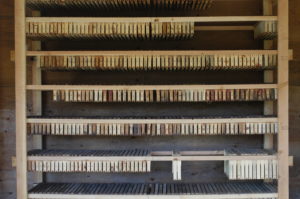Willamette Valley Beekeepers Association (WVBA) Established in 1967.
I hope you have been out to have a look at your bees. It’s been an interesting winter, or should I say the lack thereof. The hives are the strongest that I have ever seen for this time of year. The only other time, that I can remember, that we had this kind of winter/spring was in the 70’s. People up on the hill from us had their wells go dry. They had to haul water in. On Saturday March 21st, I saw some Scotch broom beginning to bloom. This is very early for Scotch broom. Since the maple is now blooming, I have put some supers on. If we had some Queens, some of the hives could be split. This year swarms will be early. We will certainly hear of some swarms out there in April.
If you already purchased nucs, they will be ready for another box in a week or two, especially if you are running 8-frame equipment. Keep feeding the nucs so they will draw out any foundation you have in the hive.
It was mentioned by one of the members at the March meeting that Ruhl’s Bee Supply had sold out of packages. This is not the case. Ruhl’s still has packages for sale. They are sold out of nucs.
If you are a student in the Oregon Master Beekeeper Program, contact your mentor so you both can plan apiary visits.
WVBA Bee Day will be held on April 11 at 9:00 am. It will be held at Steven Coffman’s Farm at 2775 Ballard Rd, Dallas OR. By attending you will get a chance to meet a queen. Well not exactly one that is royalty, but in the bee world she is royalty. Show up to WVBA Bee Day and you will get the exciting opportunity to handle frames of live bees. Bee Day is a laid back time where experienced beekeepers show you how to inspect hives of live bees. This Bee Day is organized with the newer beekeeper in mind. See how to light and use a smoker, use a hive tool, and how to suit up. See how the hives are configured and handle frames of live bees. See how to install a package and a nucleus hive (nuc). You’ll need to bring your own protective gear. Some people are comfortable with just a veil, while others are geared up for war. Bee Day will be held rain or shine. We have the ability to forklift the bee hives into a building and be undercover. Bee Day is free, we hope to see you there.
Last year 2014 was a great year for volunteerism and donations. It was great that so many came together for a common cause, promoting honeybees and beekeeping. A great deal of time and money was donated by so many. THANK YOU! All of our volunteers are what make this Association great.
Continued thanks to Erin Olmon for managing the WVBA website. Thanks also to Todd Bartlem for creating a wonderful color WVBA brochure. It looks great. Some of those got handed out at the Salem library.
We had a team of members put together and man a booth at the “Ask an Expert” at the main branch of the Salem Library. Thanks to Erma for heading up the group. Thanks to Fred Mann and Steve Rice for all their help. They provided information on beekeeping to many of the library customers.
There are several pollinator bills being considered at the House Committee on Agriculture and Natural Resources. They are: HCR 9, HB 3360, HB 3361, HB 3362, HB 2653, and HB 2589. There is also an ordinance being considered in the city of Gresham regarding beekeeping in Gresham. Mike Rodia and Joe Maresh (President of Portland Metro Beekeepers) have been working on the Gresham issues. Fred VanNatta, Mike, Joe, and others have been working on Representative Gorsek’s HB 2653. Thanks for all their hard work.
Ruhl Bee Supply has been purchased by Brushy Mountain Bee Farm out of North Carolina. John Edwards retained part ownership and will continue to manage the business.
European honeybees aren’t native to Oregon or the United States for that matter. How did honeybees get to Oregon? The earliest written account is found in History of Oregon Volume 1 by Charles Henry Carey and published by The Pioneer Historical Publishing Company, Portland 1922. Here is and excerpt from that book:
“The abundance of nectar-producing blossoms, particularly the wild clover and wild peas, which was noticed by the earliest comers, led to a number of efforts to introduce honey bees before one was successful. The loss of a hive of bees by a member of the immigration of 1846 via the Applegate trail was then with reason regarded by its owner as a calamity because he had had a promise of $500 for a hive delivered in good conditions in the territory. Further attempts were thereby discouraged, until 1854, when John Davenport of Marion County succeeded and his achievement was hailed with great joy throughout the territory, since it meant a new and welcome addition to the diet of the pioneers.”
This is a frame holder. The frames are stored out in the open air to discourage wax moth. It is undercover to avoid the rain.

